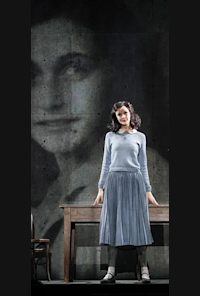"Diary of Anne Frank. White Rose" is a play about the fate of young people whose lives were tragically cut short during the Second World War. The heroes of the chamber operas "The Diary of Anne Frank" by Gregory Fried (1969) and "The White Rose" by Udo Zimmermann (1986) are real people who did not know each other in life. "Anne Frank and Sophie Scholl have never met. But on stage, their stories develop in parallel, and the heroines themselves become friends who go to death together" (Hans Joachim Frei).
The first (concert) performance of Grigory Fried's monoopery "The Diary of Anne Frank" took place on May 17, 1972 in Moscow in the House of Composers of the USSR in an arrangement for soprano and piano (soloist Nadezhda Yureneva). The composer had to wait another five years for the premiere of the work in the orchestral version: it took place in 1977 in Kislovodsk. The title role was performed by Anna Soboleva, she was "accompanied" by an orchestra conducted by Leonid Shulman. The first stage performances took place abroad - in the USA, Israel and the Netherlands. In 1985, the opera was first staged on the Russian stage: at the Voronezh Opera and Ballet Theater. The long-awaited Moscow premiere took place on the stage of the Pokrovsky Chamber Theater only in 2010. Ekaterina Vasileva's production was included in the repertoire of the theater and was nominated for the Golden Mask Award. The path of opera to the domestic audience was not fast and difficult, the reason for which was the Holocaust, which was not accepted to talk about from the theatrical stage in the Soviet Union.
The libretto is based on the diary of a Jewish girl, Anne Frank, who, along with her family, hid from the Nazis for several years in the attic of one of the Amsterdam houses. A few months before the end of the war, fifteen-year-old Anna died of typhus in a German concentration camp. The diary tells about the events of the war, growing anxiety, loss of life, family relations in isolation and the incipient love feeling for the neighbor boy - and its lines "sound" with amazing power and authenticity inherent in documentary evidence. The Russian-language text is based on a translation of the Diary made by Rita Wright-Kovaleva. The musical style of the opera is laconic and intonationally flexible - the story of the young heroine about the events experienced does not allow for verbose "argumentation".
Udo Zimmermann's opera The White Rose was first performed on 17 June 1967 at the Dresden Conservatory. A few decades later, on February 27, 1986, the Hamburg State Opera presented its second (chamber) version. In this version, the opera attracted the attention of the largest theaters and music festivals in the world: it was staged in Vienna, Berlin, Zurich, Salzburg ...
The libretto is based on the history of the resistance group "White Rose" (1942-1943), formed by students of the University of Munich. The opera's heroes, Sophie and Hans Scholl, went from members of the Hitler Youth to members of an anti-fascist organization and were executed for distributing leaflets calling for an uprising. The opera tells about the last hours of their lives before their execution on the guillotine, filled with memories, anxiety, visions ... Contrasts of torpor and despair are conveyed by an extremely expressive sound language, interspersed with allusions and quotations from music of other eras and styles from time to time: salon waltzes, military marches, works by Heinrich Schütz, Johann Sebastian Bach, Franz Schubert, Gustav Mahler, Alban Berg ...
On May 6, 2021, both operas were presented in one evening on the Chamber Stage of the Bolshoi Theater. The ideas of the director of the play, the world-famous director Hans Joachim Fry, are read clearly and clearly. Its atmosphere is formed by newsreels of the 1930-1940s, gray walls, coats and military overcoats, railway sleepers leading to the death camp, a teddy bear and a suddenly opened blue sky above the heads (production designer - Pyotr Okunev). The fates of the heroes who remained forever young, embodied in two plots - in Russian and German - converge this evening in one stage space, at one point in the story.




